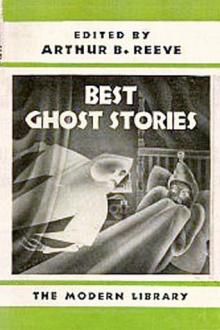In a Steamer Chair and Other Stories - Robert Barr (rm book recommendations .TXT) 📗

- Author: Robert Barr
Book online «In a Steamer Chair and Other Stories - Robert Barr (rm book recommendations .TXT) 📗». Author Robert Barr
"On one occasion Wolf Tusk and his band swooped down on a settlement where they knew that all the defenders were away, and no one but women and children were left to meet them. Here one of the most atrocious massacres of the West took place. Every woman and child in the settlement was killed under circumstances of inconceivable brutality. The buildings, such as they were, were burnt down, and, when the men returned, they found nothing but heaps of smouldering ruin.
"Wolf Tusk and his band, knowing there would be trouble about this, had made for the broken ground where they could so well defend themselves. The alarm, however, was speedily given, and a company of cavalry from the nearest fort started in hot pursuit.
"I was the physician who accompanied the troops. The men whose families had been massacred, and who were all mounted on swift horses, begged permission to go with the soldiers, and that permission was granted, because it was known that their leader would take them after Wolf Tusk on his own account, and it was thought better to have every one engaged in the pursuit under the direct command of the chief officer.
"He divided his troop into three parts, one following slowly after Wolf Tusk, and the other two taking roundabout ways to head off the savages from the broken ground and foothills from which no number of United States troops could have dislodged them. These flanking parties were partly successful. They did not succeed in heading off the Indians entirely, but one succeeded in changing their course, and throwing the Indians unexpectedly into the way of the other flanking party, when a sharp battle took place, and, during its progress, we in the rear came up. When the Indians saw our reinforcing party come towards them each man broke away for himself and made for the wilderness. Wolf Tusk, who had been wounded, and had his horse shot under him, did not succeed in escaping. The two flanking parties now having reunited with the main body, it was decided to keep the Indians on the run for a day or two at least, and so a question arose as to the disposal of the wounded chief. He could not be taken with the fighting party; there were no soldiers to spare to take him back, and so the leader of the settlers said that as they had had enough of war, they would convey him to the fort. Why the commander allowed this to be done, I do not know. He must have realized the feelings of the settlers towards the man who massacred their wives and children. However, the request of the settlers was acceded to, and I was ordered back also, as I had been slightly wounded. You can see the mark here on my cheek, nothing serious; but the commander thought I had better get back into the fort, as he was certain there would be no more need of my services. The Indians were on the run, and would make no further stand.
"It was about three days' march from where the engagement had taken place to the fort. Wolf Tusk was given one of the captured Indian horses. I attended to the wound in his leg, and he was strapped on the horse, so that there could be no possibility of his escaping.
"We camped the first night in a little belt of timber that bordered a small stream, now nearly dry. In the morning I was somewhat rudely awakened, and found myself tied hand and foot, with two or three of the settlers standing over me. They helped me to my feet, then half carried and half led me to a tree, where they tied me securely to the trunk.
"'What are you going to do? What is the meaning of this?' I said to them in astonishment.
"'Nothing,' was the answer of the leader; 'that is, nothing, if you will sign a certain medical report which is to go to the Government. You will see, from where you are, everything that is going to happen, and we expect you to report truthfully; but we will take the liberty of writing the report for you.
"Then I noticed that Wolf Tusk was tied to a tree in a manner similar to myself, and around him had been collected a quantity of firewood. This firewood, was not piled up to his feet, but formed a circle at some distance from him, so that the Indian would be slowly roasted.
"There is no use in my describing what took place. When I tell you that they lit the fire at nine o'clock, and that it was not until four in the afternoon that Wolf Tusk died, you will understand the peculiar horror of it.
"'Now,' said the leader to me when everything was over,' here is the report I have written out,' and he read to me the report which I have read to you.
"'This dead villain has murdered our wives and our children. If I could have made his torture last for two weeks I would have done so. You have made every effort to save him by trying to break loose, and you have not succeeded. We are not going to harm you, even though you refuse to sign this report. You cannot bring him to life again, thank God, and all you can do is to put more trouble on the heads of men who have already, through red devils like this, had more trouble than they can well stand and keep sane. Will you sign the report?'
"I said I would, and I did."
HOW THE CAPTAIN GOT HIS STEAMER OUT.
"On his own perticular well-wrought row,
That he's straddled for ages--
Learnt its lay and its gages--
His style may seem queer, but permit him to know,
The likeliest, sprightliest, manner to hoe."
"There is nothing more certain than that some day we mil have to record a terrible disaster directly traceable to ocean racing.
"The vivid account which one of our reporters gives in another column of how the captain of the _Arrowic_ went blundering across the bar yesterday in one of the densest fogs of the season is very interesting reading. Of course the account does not pretend to be anything more than imaginary, for, until the _Arrowic_ reaches Queenstown, if she ever does under her present captain, no one can tell how much of luck was mixed with the recklessness which took this steamer out into the Atlantic in the midst of the thickest fog we have had this year. All that can be known at present is, that, when the fog lifted, the splendid steamer _Dartonia_ was lying at anchor in the bay, having missed the tide, while the _Arrowic_ was nowhere to be seen. If the fog was too thick for the _Dartonia_ to cross the bar, how, then, did the captain of the _Arrowic_ get his boat out? The captain of the _Arrowic_ should be taught to remember that there are other things to be thought of beside the defeating of a rival steamer. He should be made to understand that he has under his charge a steamer worth a million and a half of dollars, and a cargo probably nearly as valuable. Still, he might have lost his ship and cargo, and we would have had no word to say. That concerns the steamship company and the owners of the cargo; but he had also in his care nearly a thousand human lives, and these he should not be allowed to juggle with in order to beat all the rival steamers in the world."
The above editorial is taken from the columns of the New York _Daily Mentor_. The substance of it had been cabled across to London and it made pleasant reading for the captain of the _Arrowic_ at Queenstown. The captain didn't say anything about it; he was not a talkative man. Probably he explained to his chief, if the captain of an ocean liner can possibly have a chief, how he got his vessel out of New York harbour in a fog; but, if he did, the explanation was never made public, and so here's an account of it published for the first time, and it may give a pointer to the captain of the rival liner _Dartonia_. I may say, however, that the purser was not as silent as the captain. He was very indignant at what he called the outrage of the New York paper, and said a great many unjustifiable things about newspaper men. He knew I was a newspaper man myself, and probably that is the reason he launched his maledictions against the fraternity at my head.
"Just listen to that wretched penny-a-liner," he said, rapping savagely on the paper with the back of his hand.
I intimated mildly that they paid more than a penny a line for newspaper work in New York, but he said that wasn't the point. In fact the purser was too angry to argue calmly. He was angry the whole way from Queenstown to Liverpool.
"Here," he said, "is some young fellow, who probably never saw the inside of a ship in his life, and yet he thinks he can tell the captain of a great ocean liner what should he done and what shouldn't. Just think of the cheek of it."
"I don't see any cheek in it," I said, as soothingly as possible. "You don't mean to pretend to argue, at this time of day that a newspaper man does _not_ know how to conduct every other business as well as his own."
But the purser did make that very contention, although of course he must be excused, for, as I said, he was not in a good temper.
"Newspaper men," he continued, "act as if they did know everything. They pretend in their papers that every man thinks he knows how to run a newspaper or a hotel. But look at their own case. See the advice they give to statesmen. See how they would govern Germany, or England, or any other country under the sun. Does a big bank get into trouble, the newspaper man at once informs the financiers how they should have conducted their business. Is there a great railway smash-up, the newspaper man shows exactly how it could have been avoided if he had had the management of the railway. Is there a big strike, the newspaper man steps in. He tells both sides what they should do. If every man thinks he can run a hotel, or a newspaper--and I am sure most men could run a newspaper as well as the newspapers are conducted now--the conceit of the ordinary man is nothing to the conceit of the newspaper man. He not only thinks he can run a newspaper and a hotel, but every other business under the sun."
"And how do you know he can't," I asked.
But the purser would not listen to reason. He contended that a captain who had crossed the ocean hundreds of times and for years and years had worked his way up, had just as big a sense of responsibility for his passengers and his ship and his cargo as any newspaper man in New York could have, and this palpably absurd contention he maintained all the way to Liverpool.
When a great ocean racer is making ready to put out to sea,





Comments (0)